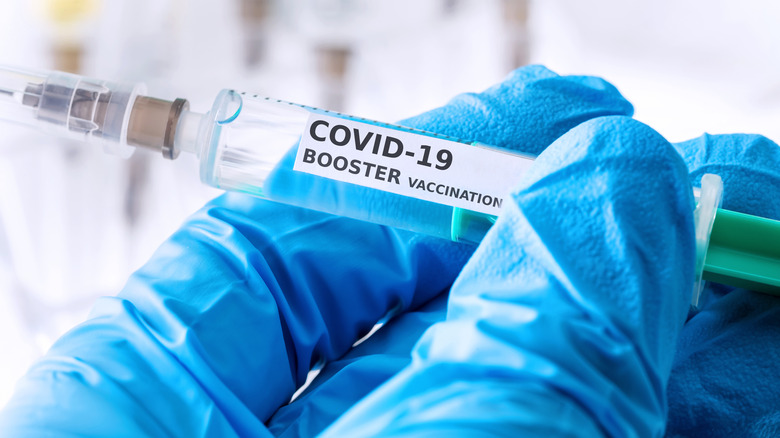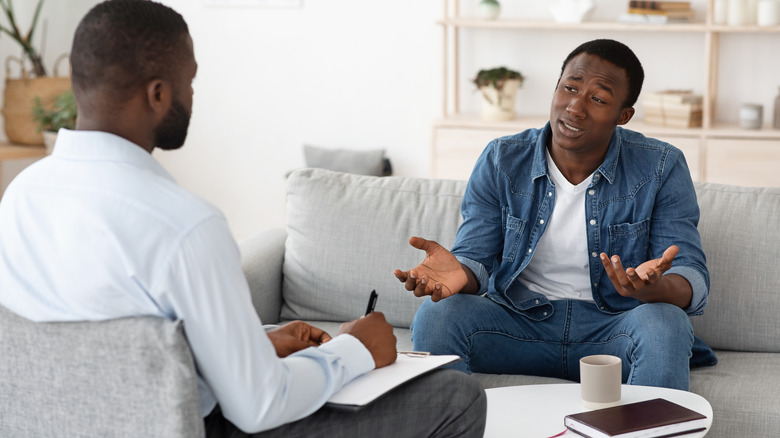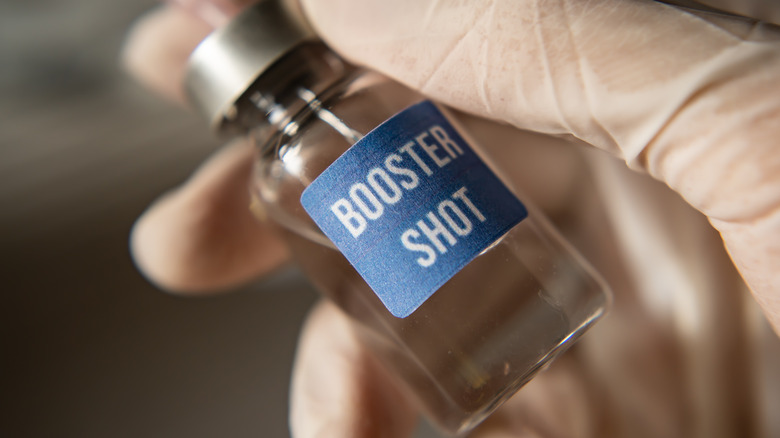The Percentage Of Americans Eligible For A COVID-19 Booster Shot May Surprise You
As of Wednesday, October 20, the U.S. Food and Drug Administration (FDA) has authorized both the Moderna and Johnson & Johnson vaccines to join Pfizer among the FDA-approved COVID-19 booster shots (via FDA). While the guidelines do differ between the 3 brands in terms of timing between one's initial vaccination and the booster shot, the greatest difference pertains to varying eligibility.
According to the FDA, Johnson & Johnson recipients who are 18 or older are now eligible to receive a single-dose COVID-19 booster shot, as long as 2 months have passed since their initial shot. For Pfizer and Moderna vaccine recipients, additional guidelines are in place regarding age, health status, and time frame. Moderna recipients need to wait at least 6 months after initial vaccination to receive a booster shot. Additionally, those eligible must be at least 65 years of age, 18 or older with an underlying health condition, or an increased risk for COVID-19 exposure through their job or living quarters. People who are eligible for the Pfizer booster shot must be 18 years of age or older with increased risk of exposure. Like Moderna, recipients are eligible once 6 months' time has passed after full vaccination, according to the FDA.
Even with these guidelines in place, WHSV3 reports that the list of what qualifies as an underlying health condition has recently expanded, making more adults potentially eligible for vaccine booster shots than previously thought.
The list of underlying health conditions has expanded
Research now indicates that those with mental health disorders may be at an increased risk for severe complications related to COVID-19 (via WHSV3). Researchers determined stress and anxiety served as risk factors similar to those of diabetes or obesity. "There truly could be a biological link between being anxious and having worse COVID-19," Dr. Bill Petri, professor of Infectious Diseases at the University of Virginia, told WHSV3. "Someone who is in a good state of mental health, it's easier to manage all these chronic underlying illnesses, and stress can directly and biologically impact your response to things."
This may very well be one of the factors influencing the results of a recent analysis conducted by epidemiologists at Boston Children's Hospital that found 89% or more of adults in the U.S. will be eligible for a COVID-19 booster shot once having met the appropriate timeline guidelines for their brand of vaccine (via CNN).
Confusion over booster shot eligibility
Having eligibility requirements clearly outlined may further help reduce public confusion regarding who is eligible. "I think there's been a lot of bombarding people with information and it's hard to keep up with information coming from multiple sources at different times," Benjamin Rader, graduate research fellow on the Boston Children's Hospital team, told CNN.
CNN reports that some health experts have voiced concerns and potential challenges related to the recent wave of booster shot approval by the FDA, with one member of the FDA's vaccine advisory panel stating that U.S. booster shots could be better put to use in countries where vaccines are in short supply. Committee member Dr. Jason Goldman also voiced concerns during a recent CDC meeting about the lack of requirements for proof of eligibility. "People are just going to go and get vaccines without any reason, and for lack of a better term, misrepresent their underlying conditions, just to get a booster," Goldman told CNN.



